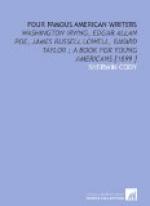Bayard Taylor was born in the country village of Kennett Square, Chester County, Pennsylvania, Jan. 11, 1825, “the year when the first locomotive successfully performed its trial trip. I am, therefore,” he says, “just as old as the railroad.” He was descended from Robert Taylor, a rich Friend, or Quaker, who had come to Pennsylvania with William Penn in 1681, and settled near Brandywine Creek. Bayard’s grandfather married a Lutheran of pure German blood, and on that account was expelled from the Society of Friends, which at that time had very strict rules regarding the marriage of its members. Although the family still used the peculiar speech of the Quakers, and clung to the Quaker principles of peace and order, none of them ever returned to the society.
When Bayard was four years old, the family moved to a farm about a mile from the village. There they lived, until, years afterward, the successful traveler and poet bought an estate near by and built a magnificent house upon it, into which he received his father and mother and brothers and sisters, with that open-hearted generosity and hospitality which was so much a part of his nature.
He was the fourth child of his parents; but the three older children had died in infancy, and he remained as the eldest of the family.
Chester County, Pennsylvania, has always been a rich farming region, peopled by solid, well-to-do farmers, many of whom are Quakers. Here the northern elms toss their arms to the southern cypresses, as the poet has it; the two climates seem to meet and mingle, in a sort of calm, neutral zone, and the vegetation of the North is united with the vegetation of the South, to produce a peculiar richness and variety.
In such surroundings the boy grew up, a farmer’s lad, and learned that love of nature which was a part of his being till the day he died. “The child,” says he, “that has tumbled into a newly plowed furrow never forgets the smell of the fresh earth.... Almost my first recollection is of a swamp, into which I went barelegged at morning, and out of which I came, when driven by hunger, with long stockings of black mud, and a mask of the same. If the child was missed from the house, the first thing that suggested itself was to climb upon a mound which overlooked the swamp. Somewhere among the tufts of rushes and the bladed leaves of the calamus, a little brown ball was sure to be seen moving, now dipping out of sight, now rising again, like a bit of drift on the rippling green. It was my head. The treasures I there collected were black terrapins with orange spots, baby frogs the size of a chestnut, thrush’s eggs, and stems of purple phlox.”




